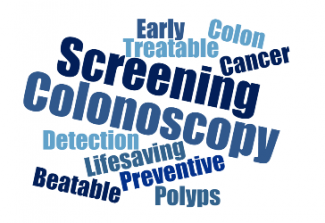
Screening for Colorectal Cancer
March is National Colon Cancer Awareness Month, so it is a good time to think about, discuss, and research colorectal cancer screenings.
Colorectal cancer is the fourth most common cancer in the United States and the second leading cause of death from cancer. Colorectal cancer affects people in all racial and ethnic groups and is most often found in people age 50 and older.
The good news? According to the U.S. Department of Health and Human Services, if everyone age 50 and older were screened regularly, 6 out of 10 deaths from colorectal cancer could be prevented.
So how are some ways communities, health professionals, and families can work together to encourage people to get screened? Here are a few ideas:
– Encourage families to get active together – exercise may help reduce the risk of colorectal cancer.
– Talk to family, friends, and people in your community about the importance of getting screened for colorectal cancer starting at age 50.
– Encourage people over 50 to use this interactive tool to decide which colorectal cancer screening test they prefer.
– Ask doctors and nurses to talk to patients age 50 and older about the importance of getting screened.
Wondering if you should be screened for colorectal cancer? You should begin screening for colorectal cancer soon after turning 50, then continue getting screened at regular intervals. However, you may need to be tested earlier than 50, or more often than other people, if:
– You or a close relative have had colorectal polyps or colorectal cancer.
– You have an inflammatory bowel disease such as Crohn’s disease or ulcerative colitis.
– You have a genetic syndrome such as familial adenomatous polyposis (FAP) or hereditary non-polyposis colorectal cancer (Lynch syndrome).
If you, or a loved one, have recently been diagnosed with colorectal cancer, or have any questions regarding treatment for colorectal cancer, please click here, or contact Alliance Cancer Center today.
